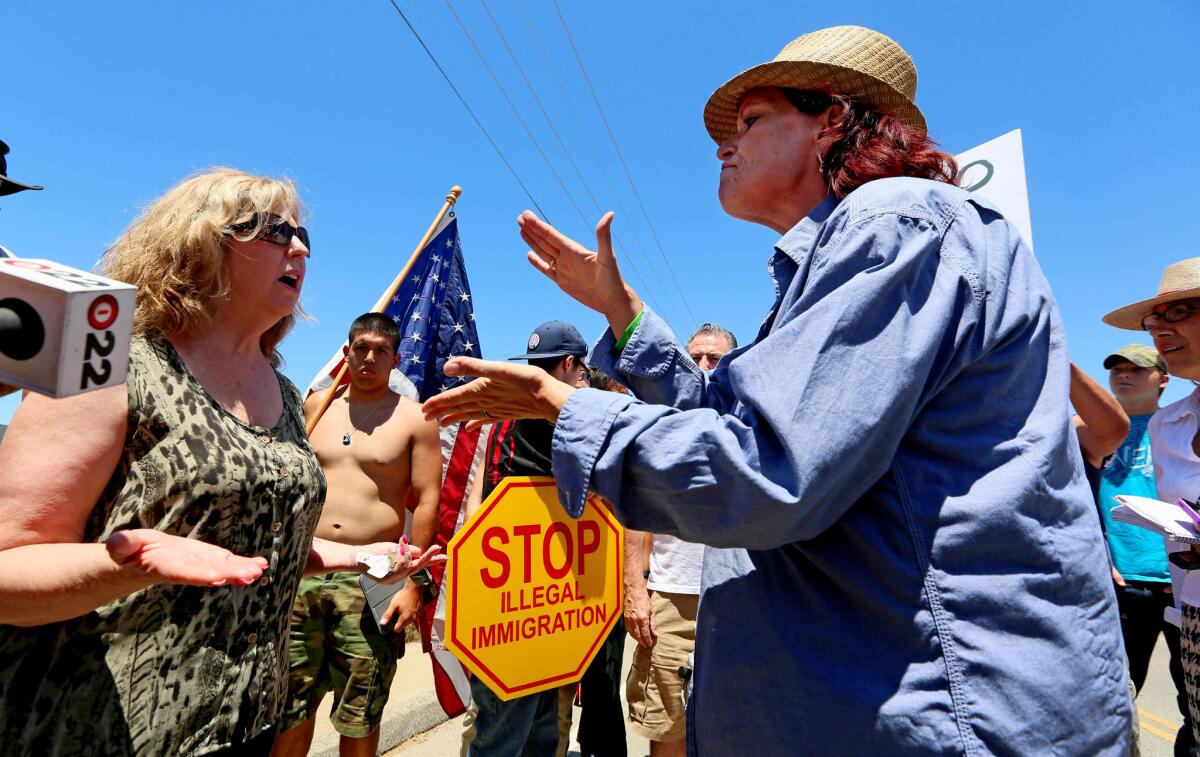Immigration protesters gather in Murrieta but buses go elsewhere

- Share via
Dozens of protesters gathered Monday in Murrieta to challenge the expected arrival of buses carrying detained immigrants to a Border Patrol station in the Inland Empire city.
But protesters waited in vain as the buses they thought would head their way instead traveled to a Border Patrol facility in San Ysidro, in San Diego County.
Federal officials did not say whether the buses were redirected to San Ysidro, or were designated to go there all along.
Still, organizers said Monday’s turnout -- though smaller than on previous days -- helped accomplish their goals.
“This is a win for this battle, but not a complete victory,” said Douglas Gibbs, who has helped to organize local protesters in Murrieta for the last two weeks.
The immigrants being transported Monday had been detained in south Texas.
After being fingerprinted at the San Ysidro station and entered into federal databases, most of the detained immigrants will be released into the custody of Immigration and Customs Enforcement agents, who will ensure that they are reunited with family members throughout the United States before appearing in Immigration Court.
Murrieta has become a front line on the national debate over immigration policy, with many residents concerned over immigrants bringing infectious disease, crime or instability to their community.
The majority of immigrants who have been scheduled to arrive in Murrieta are women and children who have traveled from Central America, and are believed to be fleeing crime and corruption in their homelands.
“The federal government will continue exploiting these children,” said Diana Serafin, a Murrieta resident and protest organizer. “Releasing them on our streets with diseases is unacceptable.”
Serafin also said she worried that the unrest over federal policy is doing damage to the city.
“The city needs a break,” Serafin said. “This is draining the resources of Murrieta. I don’t want to see our city go bankrupt.”
Advocacy groups working on behalf of the immigrants say that protesters misunderstand the plight of the arrivals.
“There is a lot of misinformation about these families,” said Jennaya Dunlap, a volunteer organizer with the Inland Empire Rapid Response Network, which has been coordinating charitable donations for the immigrants. “A lot of these people may end up being deported after a long and difficult process back to conditions that are basically unlivable, which is why they left in the first place.”
She said that in contrast to the protesters, many residents have offered support and donations for the arrivals.
In a news conference Monday, Los Angeles Mayor Eric Garcetti weighed in on the recent protests as well.
Garcetti announced that Los Angeles would become one of several major U.S. cities that will no longer keep deportable inmates in prison past their jail term without a judge’s orders -- a seeming rebuke to federal immigration officials.
“We should let the federal government do its job right now, which is trying to figure out what to do with this humanitarian crisis,” Garcetti said. “That was the first step. Not blocking buses to take kids and to somehow shove them away.”
The majority of anti-illegal immigration protesters vow to continue as long as federal officials attempt to deliver buses.
“We’re still going to be out here every 72 hours,” Gibbs said.
matt.hansen2@latimes.com
Times staff writer Emily Alpert Reyes in Los Angeles contributed to this report.
Twitter: @mtthnsn
More to Read
Sign up for Essential California
The most important California stories and recommendations in your inbox every morning.
You may occasionally receive promotional content from the Los Angeles Times.













